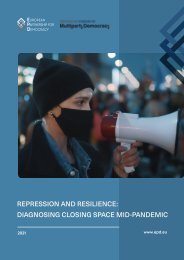Thinking Democratically: A Comprehensive Approach to Countering and Preventing Shrinking Space
You also want an ePaper? Increase the reach of your titles
YUMPU automatically turns print PDFs into web optimized ePapers that Google loves.
Executive Summary<br />
‘<strong>Shrinking</strong> civic space’ has been the buzzword in international fora <strong>and</strong> discussions on civil society<br />
for the last 10 years. In roughly the same period, data <strong>and</strong> research have shown that democracy is in<br />
decline globally, with some arguing we are experiencing the third wave of au<strong>to</strong>cratisation. 1 The<br />
challenges <strong>to</strong> democracy have only intensified as a result of the response <strong>to</strong> the COVID-19 p<strong>and</strong>emic,<br />
with the adoption of restrictive measures across the world <strong>and</strong> serious concerns over the looming<br />
economic recession.<br />
The phenomenon of ‘shrinking space’ has long been considered <strong>to</strong> be separate from the global trend<br />
of increasing challenges <strong>to</strong> democracies around the world. However, more recently an increasing<br />
number of policy-makers <strong>and</strong> practitioners have called on the international community <strong>to</strong> broaden<br />
the narrative of ‘shrinking civic space’ <strong>to</strong> a closing of democratic space more generally. They argue<br />
that the current narrative of civic space has led <strong>to</strong> a narrow interpretation of the issue as a civil<br />
society problem, leading <strong>to</strong> a reactive <strong>and</strong> legalistic response.<br />
This tension resulting from the lack of conceptual clarity on closing space lies at the heart of the<br />
mixed <strong>and</strong> limited results from the international community’s efforts <strong>to</strong> counter closing civic space.<br />
This paper has attempted <strong>to</strong> provide further evidence in order <strong>to</strong> enhance the underst<strong>and</strong>ing of<br />
different tactics for closing democratic space, <strong>and</strong> thereby contribute <strong>to</strong> a strategic framework for<br />
countering <strong>and</strong> preventing attacks on democratic space.<br />
This paper brings <strong>to</strong>gether 7 case studies on closing democratic space by experts from countries in<br />
Latin America, Eastern Europe <strong>and</strong> sub-Saharan Africa as well as examples from Europe. The paper<br />
concludes with actionable recommendations for preventing <strong>and</strong> reacting <strong>to</strong> closing democratic space.<br />
Three broad tactics <strong>to</strong> close democratic space were identified in the research that we suggest as a<br />
framework of analysis for underst<strong>and</strong>ing closing democratic space. These are:<br />
1. Restricting civic space (particularly freedom of expression, assembly <strong>and</strong> association) with<br />
various legal, administrative, extra-legal <strong>and</strong> political measures, <strong>and</strong> thereby inhibiting the<br />
proper functioning of media outlets, emerging political (opposition) forces, <strong>and</strong> civil society<br />
organisations (CSOs).<br />
1<br />
Lührmann, A. & Lindberg, S. (2019): a third wave of au<strong>to</strong>cratization is here: what is new about it? Democratization 26:7.<br />
Available here.<br />
5

















